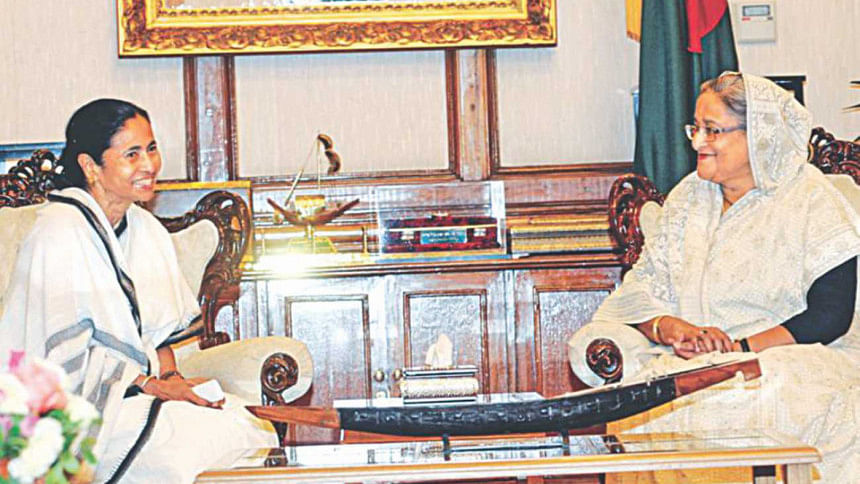A visit high on hopes, reliant on trust

The build-up to Bangladesh Prime minister Sheikh Hasina's four-day official visit to India beginning today has been eventful, if somewhat charged with emotion. On the eve of her departure, the initial cautious optimism gave way to forward looking hopes and expectations about the outcome. A respect for sensibilities of a country with global acclaim for its prospects couldn't be lost on the neighboring host.
With a proposal or a feeler for a defence treaty in the air, hints of a delayed Teesta accord and a plethora of MoUs being in the works, a public or media discourse followed on the points at issue. This was featured by free, frank and candid expression of views and concerns both in Bangladesh and India leading to an informal exchange of opinions courtesy of media institutions of the two countries.
Thus, leaders of the two neighbouring countries have been made aware of public opinion on either side of the border as they approach their bilateral agendas, some with sub-regional and regional implications.
BJP leader Vajpayee and Janata Dal leader IK Gujral, two former prime ministers of India, were wedded to 'beneficial bilateralism'. Befriending neighbours came to be known as the Gujral doctrine. When Narendra Modi came to power, he would launch his 'neighbour first policy' by inviting the heads of government in the Saarc region to his oath-taking ceremony. That initiative was short-lived as far as Pakistan went.
Yet two pieces of track records by non-Congress governments may well resonate with Narendra Modi: Signing of the Chittagong Hill Tracts peace accord on December 2, 1997 and the Ganges Water Treaty on December 12, 1996. Both came about during Hasina government's first tenure with non-Congress coalition governments in India.
It must be placed on record though that it was the Congress dominated union government led by Dr Manmohan Singh which put Indo-Bangla relations firmly on a growth trajectory in 2010 and 2011. Besides, the Land Boundary Agreement (LBA) with border protocol, there was a composite agreement on cooperation in a wide range of fields. It was felt that Hasina had gone the extra mile at some political risk with important water sharing issues remaining unresolved, among others.
Upbeat as we may be about 33 deals and MoUs to be signed between the two countries during the PM's visit, we cannot allow our focus to be diffused on Teesta water sharing deal. The costs of delay incurred through lost productivity and livelihoods coupled with water scarcity and ecological hazards are horrific.
On the important issue of basin-wide management of river resources, there are two opinions. According to one school of thought we must do it sub- regionally among India, Bangladesh and Nepal. The other view is that the Brahmaputra basin may require a wider participation, inclusive of China. Lately, the former view is taking hold.
Narendra Modi's government, however, has to do a correctional update relating to the Ganges water treaty. It was supposed to have been reviewed every five years but this has gone completely by default ever since 1997. The time for a renewal of the treaty is approaching so that a stock-taking of its implementation or gaps is due. Although the agreement lacked a guarantee clause, it contained a wish that it would be followed in crafting accords for sharing waters of other common rivers. There is a need for perfecting the 'model.'
Trade is another persistent issue with India. The annual trade surplus is heavily weighted towards India by USD 5 billion. Bangladesh's export is above USD 500 million. Several non-tariff barriers continue to impede export of our RMG and pharmaceutical products. BSTI's quality certificate for export remains unresolved.
"Even if physical connectivity is there, difficult customs rules and other non-tariff barriers will create complications," says an expert.
One particularly sensitive issue is this: As long as Bangladeshis get killed at the border by BSF personnel, people here cannot be faulted for thinking that the lives of Bangladeshis are undervalued on the other side!
A final point, Indian President Pranab Mukherjee is reportedly inviting chief ministers of five northeast Indian states plus Mamata Banerjee over to a dinner in Rashtrapati Bhavan where our Prime Minister is billeted. This gesture could just help Mamata Banerjee to be taken on board for a Teesta resolution.

 For all latest news, follow The Daily Star's Google News channel.
For all latest news, follow The Daily Star's Google News channel. 



Comments